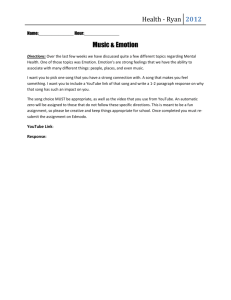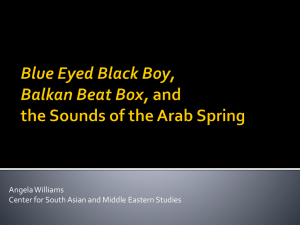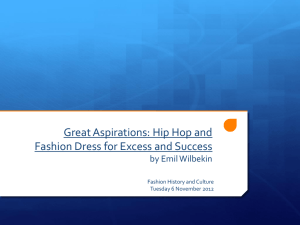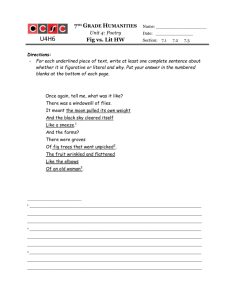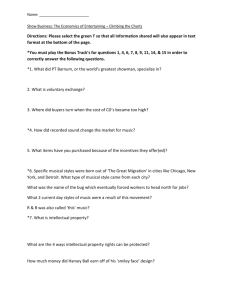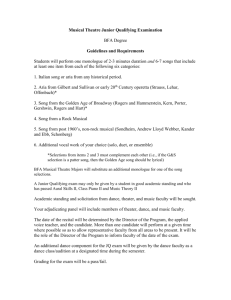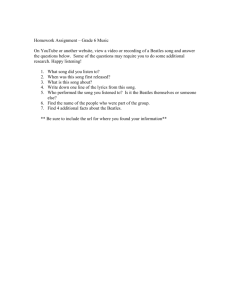C20th American music 2015
advertisement
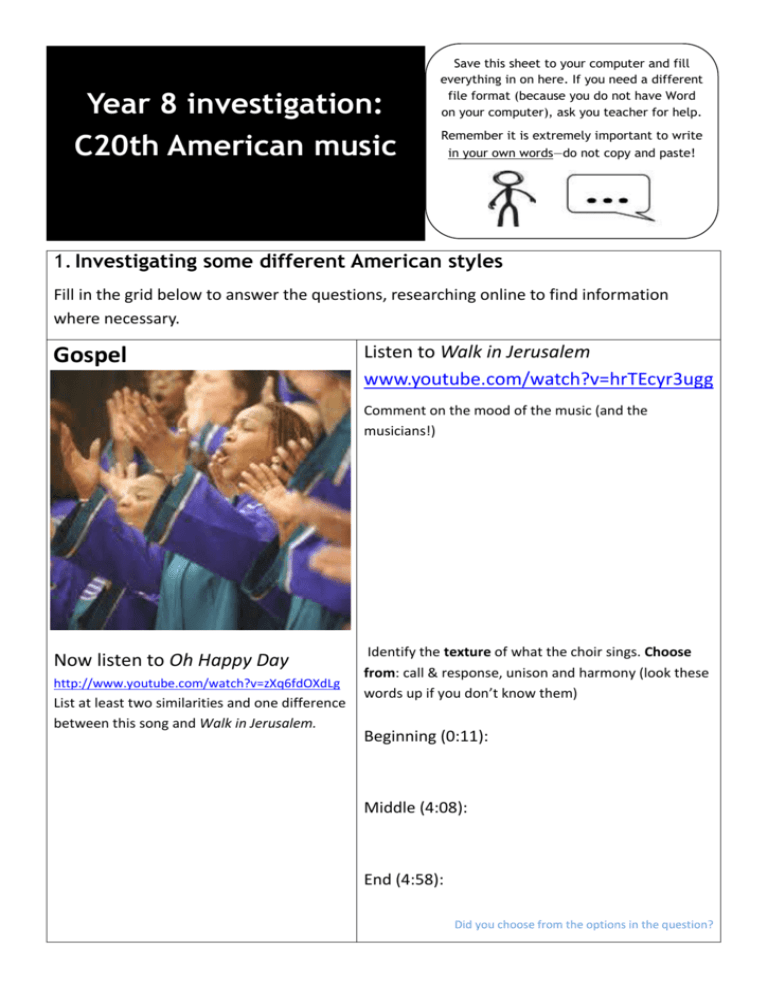
Year 8 investigation: C20th American music Save this sheet to your computer and fill everything in on here. If you need a different file format (because you do not have Word on your computer), ask you teacher for help. Remember it is extremely important to write in your own words—do not copy and paste! 1. Investigating some different American styles Fill in the grid below to answer the questions, researching online to find information where necessary. Gospel Listen to Walk in Jerusalem www.youtube.com/watch?v=hrTEcyr3ugg Comment on the mood of the music (and the musicians!) Now listen to Oh Happy Day http://www.youtube.com/watch?v=zXq6fdOXdLg List at least two similarities and one difference between this song and Walk in Jerusalem. Identify the texture of what the choir sings. Choose from: call & response, unison and harmony (look these words up if you don’t know them) Beginning (0:11): Middle (4:08): End (4:58): Did you choose from the options in the question? Freedom songs Research the civil rights movement in the USA. What were people campaigning about? Who were the leaders? How successful were they? Research Jim Crow laws When were they in force, and what did they say? Watch Ain’t Gonna Let Nobody Turn Me Around https://www.youtube.com/watch?v=WPuBGcng6Tw How is this music similar to and different from gospel? How does this song relate to the civil rights movement? Dixieland jazz Watch Oh When the Saints http://www.youtube.com/watch?v=i8FOOu4TS80 There are six different instruments being played. Identify them all (you may need to research Dixieland jazz to find out their names). 1. 2. 3. 4. 5. 6. Dixieland is not a real place! Where did it start? What musical styles did Dixieland grow out of (i.e. what came before)? Where did it spread to later? What musical styles did Dixieland grow into (i.e. what came after)? Name a famous Dixieland musician. Country music Watch Stand By Your Man http://www.youtube.com/watch?v=CMXnu31-k_U This is sung by Tammy Wynette, one of the most famous country singers. Find the names of five more (male and female). 1. 2. 3. 4. You will hear one of these in Stand By Your Man. 5. What is it called, and what does the musician do to play it? Research country music Which part of the USA did country music start in, and when was this? Here is a clue: https://www.youtube.com/watch?v=NrbSL92Kz1Y What musical styles grew into country? What are its musical characteristics? What country singers are around now? Hip Hop Watch Rapper’s Delight http://www.youtube.com/watch?v=q5-ASsIa37w This was one of the first hip hop hits. Research the song (i.e. on Wikipedia). The song uses another song as its backing. What is it? What legal problem did this cause, and how was it resolved? Watch Harder Than You Think https://www.youtube.com/watch?v=pCx5Std7mCo Why do you think this song was so popular at the time? This song was released in 2007. How has the musical style of hip hop changed since Rapper’s Delight? Research hip hop Which part of the USA did hip hop start in, and when was this? What musical styles grew into hip hop? This was chosen as the theme song for the 2012 Paralympics. Why do you think they chose this song? What other art forms come under the heading of hip hop? What hip hop artists are around now? 3. Create an extended piece of work about American music of the 20th century. You can choose how you do this: A piece of extended writing (word document) - this should be over 1000 words A podcast (i.e. audio recording) A video A powerpoint (minimum 8 slides, include diagrams, pictures and hyperlinks) A detailed mindmap or infographic (for more info on how to do this, visit http://www.mindmapping.co.uk/make-mindmap.htm, http://www.easel.ly/ or http://infogr.am/ ) The focus is up to you: Origins and history of one particular style The evolution of styles in the USA in the C20th (like a family tree) Ways in which history/politics have influenced American musical styles . Recommended websites to find more info You will find lots of information of Wikipedia about all the different styles. Subject-specific terms that can/should be used: tempo, metre (beats in a bar), harmony, tonality, instrumentation, dynamics, accompaniment, melody, rhythm, chords, structure, minor, major, consonant, dissonant, riff, sample.
